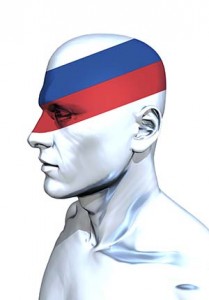Post developed by Katie Brown and William Zimmerman.
Russian President Vladimir Putin often makes headlines. This week, U.S. sanctions against Putin in the wake of the Ukraine crisis dominated the news, while Putin’s rewrite of recent music history appeared in popular culture news. Why is Putin such an interesting figure in America? Is it because he challenges our notions of “normal”?
On April 27, Princeton University Press released Ruling Russia: Authoritarianism from the revolution to Putin, the latest book by Center for Political Studies (CPS) Professor Emeritus William Zimmerman. Ruling Russia traces Russia’s history over the last century. The definition of normalcy varied with Russia’s leaders. Gorbachev and Yeltsin for all their differences conceived normalcy to correspond with Western political systems while the leaders of the failed coup against Gorbachev in 1991 and Putin more recently have defined normal to equate with stability, security, and absence of change.
Zimmerman argues that there have been plural Soviet systems and plural Russian political systems and provides a typology to encompass the government types across the century from the revolution to today which distinguishes among democratic, competitive authoritarian, full authoritarian, and totalitarian regimes.
With that as background we can consider the last two decades to better understand current politics in Russia. From 1996 to 2008, after a brief move toward democracy, Russian elections became less open, less competitive, and more meaningless. This time period witnessed Putin’s first (2000) and second (2004) election to President. With Putin unable to run for a third consecutive term in 2008, Dmitry Medvedev ran for President and Putin became Prime Minister.
Then, Medvedev and Putin “castled” in 2012, with Putin running again for President and Medvedev being named Premier. While some believe this move was agreed upon between Putin and Medvedev back in 2008, there is no evidence of this. Zimmerman believes Putin put forth the idea in 2011. Regardless, and interestingly, the 2011-2012 election cycle was more competitive and less predictable than its predecessors. Putin ran a campaign supporting the status quo, stability, and nationalism – a return to normalcy.
The book’s historical analysis ends in 2013. Zimmerman sees full authoritarianism as the most likely near term evolution. This would map onto recent events, including the crackdown on homosexuality during the Sochi-hosted Olympics and military aggression in Ukraine.
From an American vantage point, each move away from democracy was a move away from normal. But for Russia, the idea of “normal” moved toward authoritarianism.
Zimmerman dedicates the book to his students, stating that insights from their dissertations inspired multiple parts of the book.


